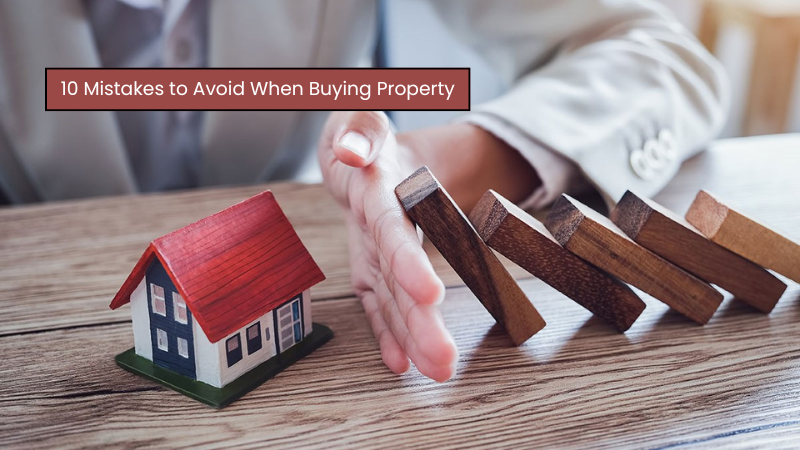Buying property is a big milestone—and often one of the largest financial decisions you’ll make. Whether you’re purchasing a home to live in or investing in real estate, it’s easy to get excited and overlook key details. But one wrong move can cost you time, money, or peace of mind.
This blog will walk you through the 10 most common mistakes people make when buying property—and how you can avoid them. A smart buyer is a prepared buyer. Let’s make sure you step into your new property with confidence, not regret.
1. Not Getting Pre-Approved for a Loan
Before you start house hunting, you need to know exactly what you can afford. One of the biggest mistakes buyers make is looking at properties without getting pre-approved for a loan.
Why this matters:
- Helps you set a realistic budget
- Shows sellers you’re serious
- Speeds up the buying process
Without pre-approval, you might fall in love with a property that’s out of your budget—or lose out to another buyer who came prepared. Always speak to your bank or mortgage broker first.
2. Ignoring the Total Costs
Buying property involves more than just the purchase price. Many buyers underestimate the true cost of owning a property, which leads to budget surprises.
Hidden costs include:
- Property taxes
- Insurance
- Maintenance and repairs
- Legal and registration fees
- HOA or society charges (if applicable)
Always create a full budget including these costs before committing. This will help you avoid financial stress after the purchase is complete.
3. Skipping the Home Inspection
It’s easy to fall for a beautiful-looking home, but looks can be deceiving. Skipping a professional home inspection can cost you thousands in future repairs.
Inspections check for:
- Structural damage
- Plumbing/electrical issues
- Roof or foundation problems
- Pest infestations
Even new homes can have hidden defects. Always hire a trusted inspector and never skip this step—no matter how “perfect” the home looks.
4. Letting Emotions Drive the Purchase
Buying property is emotional—but your decisions should be based on logic and facts. Many buyers let excitement, pressure, or a personal attachment push them into a poor deal.
Emotional mistakes include:
- Overbidding in a hot market
- Ignoring red flags
- Choosing style over structure
Be patient. Make your decision with a clear mind, and don’t be afraid to walk away if things don’t feel right.
5. Not Researching the Neighborhood
A beautiful home in a bad area is still a bad deal. Many buyers focus only on the property, forgetting to research the neighborhood, schools, safety, and amenities.
Key things to check:
- Crime rates
- School ratings
- Future development plans
- Commute times and traffic
- Local shops, parks, and hospitals
You’re not just buying a home—you’re buying into a lifestyle. Make sure the location supports it.
6. Forgetting to Check Legal Clearances
Not verifying the legal paperwork of a property can lead to years of trouble. In many places, buyers end up stuck in legal disputes because they didn’t check documents properly.
Always confirm:
- Clear title and ownership
- Approved land use and zoning
- Completion and occupancy certificates
- No unpaid dues or litigation
Hire a legal expert if needed. It’s a small cost compared to what you could lose if things go wrong.
7. Not Comparing Loan Offers
Many first-time buyers stick to their existing bank for a home loan without comparing options. This can lead to higher interest rates and less flexible terms.
Why shopping around helps:
- You might find lower interest rates
- Some lenders offer lower processing fees
- Better prepayment and foreclosure options
Compare at least 3–5 lenders and use online EMI calculators. Saving even 0.5% on interest can make a huge difference over the life of the loan.
8. Overlooking Resale Value
It’s easy to think only about your current needs when buying a home. But things change—jobs, family size, or even your taste. Considering resale potential is crucial.
Look for:
- Popular or upcoming locations
- Good layout and ventilation
- Quality construction
- Proximity to transport and schools
Buying a property that’s hard to sell later can trap your money. Make sure your investment will still appeal to future buyers or tenants.
9. Rushing Into a Decision
The pressure to “buy before someone else does” is real. But rushing into a purchase without proper research is risky.
What happens when you rush:
- You overlook flaws
- You skip paperwork
- You settle for less than ideal
Take your time. Visit multiple properties. Ask questions. Sleep on it. A smart buyer is always a careful one.
10. Not Thinking Long-Term
Many buyers focus only on what suits them now, not thinking about the future. But property is a long-term commitment.
Consider these questions:
- Will your family grow?
- Is the area developing or declining?
- Will the home need major repairs soon?
- Can you afford it if interest rates rise?
Buy a home that fits your future—not just your present. This mindset can protect your investment and bring peace of mind for years to come.
Conclusion
Buying property is exciting—but it comes with risks. By avoiding these 10 common mistakes, you can protect your investment, your wallet, and your peace of mind.
Always do your research, take your time, and ask for help when needed. Whether it’s your dream home or a smart investment, the right property is out there. With the right knowledge and approach, you’ll find it—and make the buying journey a successful one.

Leave a Reply